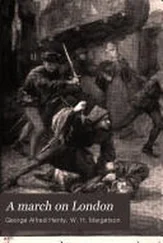George Henty - When London Burned - a Story of Restoration Times and the Great Fire
Здесь есть возможность читать онлайн «George Henty - When London Burned - a Story of Restoration Times and the Great Fire» — ознакомительный отрывок электронной книги совершенно бесплатно, а после прочтения отрывка купить полную версию. В некоторых случаях можно слушать аудио, скачать через торрент в формате fb2 и присутствует краткое содержание. Жанр: foreign_children, foreign_antique, foreign_prose, на английском языке. Описание произведения, (предисловие) а так же отзывы посетителей доступны на портале библиотеки ЛибКат.
- Название:When London Burned : a Story of Restoration Times and the Great Fire
- Автор:
- Жанр:
- Год:неизвестен
- ISBN:нет данных
- Рейтинг книги:5 / 5. Голосов: 1
-
Избранное:Добавить в избранное
- Отзывы:
-
Ваша оценка:
- 100
- 1
- 2
- 3
- 4
- 5
When London Burned : a Story of Restoration Times and the Great Fire: краткое содержание, описание и аннотация
Предлагаем к чтению аннотацию, описание, краткое содержание или предисловие (зависит от того, что написал сам автор книги «When London Burned : a Story of Restoration Times and the Great Fire»). Если вы не нашли необходимую информацию о книге — напишите в комментариях, мы постараемся отыскать её.
When London Burned : a Story of Restoration Times and the Great Fire — читать онлайн ознакомительный отрывок
Ниже представлен текст книги, разбитый по страницам. Система сохранения места последней прочитанной страницы, позволяет с удобством читать онлайн бесплатно книгу «When London Burned : a Story of Restoration Times and the Great Fire», без необходимости каждый раз заново искать на чём Вы остановились. Поставьте закладку, и сможете в любой момент перейти на страницу, на которой закончили чтение.
Интервал:
Закладка:
The next day he began his work again; he had two visits to pay of an hour each, and one of two hours, and the spare time between these he filled up by calling at two or three other shops to make up for the arrears of work during the last few days.
The last place he had to visit was that at which he had the longest task to perform. It was at a ship-chandler's in Tower Street, a large and dingy house, the lower portion being filled with canvas, cordage, barrels of pitch and tar, candles, oil, and matters of all sorts needed by ship-masters, including many cannon of different sizes, piles of balls, anchors, and other heavy work, all of which were stowed away in a yard behind it. The owner of this store was a one-armed man. His father had kept it before him, but he himself, after working there long enough to become a citizen and a member of the Ironmongers' Guild, had quarrelled with his father and had taken to the sea. For twenty years he had voyaged to many lands, principally in ships trading in the Levant, and had passed through a great many adventures, including several fights with the Moorish corsairs. In the last voyage he took, he had had his arm shot off by a ball from a Greek pirate among the Islands. He had long before made up his differences with his father, but had resisted the latter's entreaties that he should give up the sea and settle down at the shop; on his return after this unfortunate voyage he told him that he had come home to stay.
"I shall be able to help about the stores after a while," he said, "but I shall never be the man I was on board ship. It will be hard work to take to measuring out canvas and to weighing iron, after a free life on the sea, but I don't so much mind now I have had my share of adventures; though I dare say I should have gone on for a few more years if that rascally ball had not carried away my arm. I don't know but that it is best as it is, for the older I got the harder I should find it to fall into new ways and to settle down here."
"Anyhow, I am glad you are back, David," his father said.
"You are forty-five, and though I don't say it would not have been better if you had remained here from the first, you have learnt many things you would not have learnt here. You know just the sort of things that masters of ships require, and what canvas and cables and cordage will suit their wants. Besides, customers like to talk with men of their own way of thinking, and sailors more, I think, than other men. You know, too, most of the captains who sail up the Mediterranean, and may be able to bring fresh custom into the shop. Therefore, do not think that you will be of no use to me. As to your wife and child, there is plenty of room for them as well as for you, and it will be better for them here, with you always at hand, than it would be for them to remain over at Rotherhithe and only to see you after the shutters are up."
Eight years later Captain Dave, as he was always called, became sole owner of the house and business. A year after he did so he was lamenting to a friend the trouble that he had with his accounts.
"My father always kept that part of the business in his own hands," he said, "and I find it a mighty heavy burden. Beyond checking a bill of lading, or reading the marks on the bales and boxes, I never had occasion to read or write for twenty years, and there has not been much more of it for the last fifteen; and although I was a smart scholar enough in my young days, my fingers are stiff with hauling at ropes and using the marling-spike, and my eyes are not so clear as they used to be, and it is no slight toil and labour to me to make up an account for goods sold. John Wilkes, my head shopman, is a handy fellow; he was my boatswain in the Kate , and I took him on when we found that the man who had been my father's right hand for twenty years had been cheating him all along. We got on well enough as long as I could give all my time in the shop; but he is no good with the pen—all he can do is to enter receipts and sales.
"He has a man under him, who helps him in measuring out the right length of canvas and cables or for weighing a chain or an anchor, and knows enough to put down the figures; but that is all. Then there are the two smiths and the two apprentices; they don't count in the matter. Robert Ashford, the eldest apprentice, could do the work, but I have no fancy for him; he does not look one straight in the face as one who is honest and above board should do. I shall have to keep a clerk, and I know what it will be—he will be setting me right, and I shall not feel my own master; he will be out of place in my crew altogether. I never liked pursers; most of them are rogues. Still, I suppose it must come to that."
"I have a boy come in to write my bills and to make up my accounts, who would be just the lad for you, Captain Dave. He is the son of a broken-down Cavalier, but he is a steady, honest young fellow, and I fancy his pen keeps his father, who is a roystering blade, and spends most of his time at the taverns. The boy comes to me for an hour, twice a week; he writes as good a hand as any clerk and can reckon as quickly, and I pay him but a groat a week, which was all he asked."
"Tell him to come to me, then. I should want him every day, if he could manage it, and it would be the very thing for me."
"I am sure you would like him," the other said; "he is a good-looking young fellow, and his face speaks for him without any recommendation. I was afraid at first that he would not do for me; I thought there was too much of the gentleman about him. He has good manners, and a gentle sort of way. He has been living in France all his life, and though he has never said anything about his family—indeed he talks but little, he just comes in and does his work and goes away—I fancy his father was one of King Charles's men and of good blood."
"Well, that doesn't sound so well," the sailor said, "but anyhow I should like to have a look at him."
"He comes to me to-morrow at eleven and goes at twelve," the man said, "and I will send him round to you when he has done."
Cyril had gone round the next morning to the ships' store.
"So you are the lad that works for my neighbour Anderson?" Captain Dave said, as he surveyed him closely. "I like your looks, lad, but I doubt whether we shall get on together. I am an old sailor, you know, and I am quick of speech and don't stop to choose my words, so if you are quick to take offence it would be of no use your coming to me."
"I don't think I am likely to take offence," Cyril said quietly; "and if we don't get on well together, sir, you will only have to tell me that you don't want me any longer; but I trust you will not have often the occasion to use hard words, for at any rate I will do my best to please you."
"You can't say more, lad. Well, let us have a taste of your quality. Come in here," and he led him into a little room partitioned off from the shop. "There, you see," and he opened a book, "is the account of the sales and orders yesterday; the ready-money sales have got to be entered in that ledger with the red cover; the sales where no money passed have to be entered to the various customers or ships in the ledger. I have made out a list—here it is—of twelve accounts that have to be drawn out from that ledger and sent in to customers. You will find some of them are of somewhat long standing, for I have been putting off that job. Sit you down here. When you have done one or two of them I will have a look at your work, and if that is satisfactory we will have a talk as to what hours you have got disengaged, and what days in the week will suit you best."
It was two hours before Captain Dave came in again. Cyril had just finished the work; some of the accounts were long ones, and the writing was so crabbed that it took him some time to decipher it.
Читать дальшеИнтервал:
Закладка:
Похожие книги на «When London Burned : a Story of Restoration Times and the Great Fire»
Представляем Вашему вниманию похожие книги на «When London Burned : a Story of Restoration Times and the Great Fire» списком для выбора. Мы отобрали схожую по названию и смыслу литературу в надежде предоставить читателям больше вариантов отыскать новые, интересные, ещё непрочитанные произведения.
Обсуждение, отзывы о книге «When London Burned : a Story of Restoration Times and the Great Fire» и просто собственные мнения читателей. Оставьте ваши комментарии, напишите, что Вы думаете о произведении, его смысле или главных героях. Укажите что конкретно понравилось, а что нет, и почему Вы так считаете.












